Overview
In today's healthcare landscape, providers often face overwhelming emotional challenges. The administrative burdens can weigh heavily, detracting from the time and energy they wish to devote to their patients. It’s essential to recognize how these pressures can impact the quality of care delivered.
Medical software systems, such as CosmaNeura, Epic Systems, and Teladoc Health, offer promising solutions. By enhancing administrative efficiency and patient management, these tools help alleviate some of the stress healthcare providers experience. Imagine a world where technology takes care of routine tasks, allowing professionals to focus on what truly matters—meaningful interactions with their patients.
These systems not only improve access to care but also integrate AI technologies that automate tasks, ultimately enhancing the overall quality of care. This shift empowers healthcare providers to nurture their patients better, fostering a more compassionate environment.
If you're feeling the weight of administrative duties, consider exploring these innovative solutions. They can help create a more supportive and efficient healthcare experience, allowing you to reconnect with your passion for patient care. Together, let’s embrace the future of healthcare that prioritizes both efficiency and empathy.
Introduction
In the rapidly evolving landscape of healthcare, many providers face emotional challenges as they navigate the complexities of their operations. Technology is stepping in to revolutionize this experience, offering solutions that lighten the load. From AI-driven administrative tools to comprehensive electronic health record (EHR) systems, innovative platforms are emerging to ease the burdens of time-consuming tasks. This shift allows clinicians to refocus on what truly matters: patient care.
As organizations strive to enhance operational efficiency and improve patient outcomes, the impact of administrative burdens on care delivery becomes increasingly apparent. Understanding the capabilities of these advanced technologies is essential for fostering a supportive environment. These solutions not only empower providers but also streamline processes, ultimately leading to a better healthcare experience for everyone involved.
This article delves into the transformative potential of leading healthcare technology solutions. By highlighting how they can alleviate challenges, we aim to inspire providers to explore these innovations further. Together, we can foster a healthcare landscape that prioritizes compassion and excellence in patient care.
CosmaNeura: AI-Driven Administrative Efficiency for Healthcare Providers
CosmaNeura stands at the forefront of AI technology designed for primary care practitioners, especially those who uphold Christian values. Are you feeling overwhelmed by administrative tasks? Our platform, which includes by automating essential duties such as appointment scheduling, medical record management, client intake, triage, and billing optimization, significantly reduces the administrative burden on providers. This automation allows clinicians to reclaim valuable time, enabling them to focus more on meaningful interactions with individuals, ultimately improving the overall quality of care.
Recent statistics reveal that:
- 92% of clinicians report that AI assistants effectively reduce the documentation burdens associated with electronic health records (EHRs).
- A significant trend in medical services shows that 20% of primary care organizations have already adopted AI technologies, particularly in diagnostics.
- Projections suggest a staggering 270% growth in AI adoption over the next four years.
This shift is expected to deliver over $2 trillion in value, encompassing cost savings and improved patient outcomes, underscoring the transformative potential of AI in healthcare, including medical software systems examples like automated patient intake forms, , and streamlined billing processes. By incorporating these values into its platform, CosmaNeura offers medical practitioners a distinctive opportunity to improve their administrative processes while staying true to their moral and ethical obligations. Together, we can navigate the challenges in healthcare and enhance the care provided to every patient.
Epic Systems: Comprehensive EHR Solutions for Enhanced Patient Management
Healthcare providers often find themselves overwhelmed by administrative burdens that detract from their primary mission: delivering exceptional patient care. Epic Systems offers a robust electronic health record (EHR) platform that integrates essential medical functions, including appointment scheduling, billing, and clinical documentation. By automating these labor-intensive tasks, medical professionals can reclaim precious time to focus on what truly matters—their patients.
The user-friendly interface allows for effortless access to detailed medical records, empowering providers to make informed decisions that lead to improved outcomes. With a strong emphasis on interoperability, Epic Systems facilitates seamless information sharing among providers, fostering enhanced collaboration across various care settings. Recent statistics reveal that the electronic medical records market in North America was valued at around USD 14.72 billion in 2024. This growth is driven by government initiatives promoting IT usage in healthcare and the increasing demand for efficient administrative processes. Notably, Epic Systems has been at the forefront of these advancements, showcasing remarkable improvements in care management and patient outcomes.
Consider the recent developments in the EHR market, where Epic's integration of AI technologies is designed to improve clinical documentation and alleviate clinician burnout. These innovations not only enhance operational efficiency but also support medical professionals in delivering high-quality service. As the landscape of electronic health records continues to evolve, Epic Systems remains committed to providing medical software systems examples that enhance management and outcomes, reinforcing its position as a leader in the medical technology sector. In light of these advancements, medical providers should reflect on how adopting comprehensive EHR solutions, which are among the medical software systems examples like Epic Systems, can streamline their operations and improve service delivery. Embracing such technologies is essential for remaining competitive in the rapidly evolving healthcare landscape.
Key Benefits of :
- Regain valuable time to focus on patient care.
- Enhance collaboration through seamless information sharing.
- Improve operational efficiency with AI integration.
By considering these solutions, healthcare professionals can take a significant step towards alleviating their administrative burdens and enhancing the care they provide.
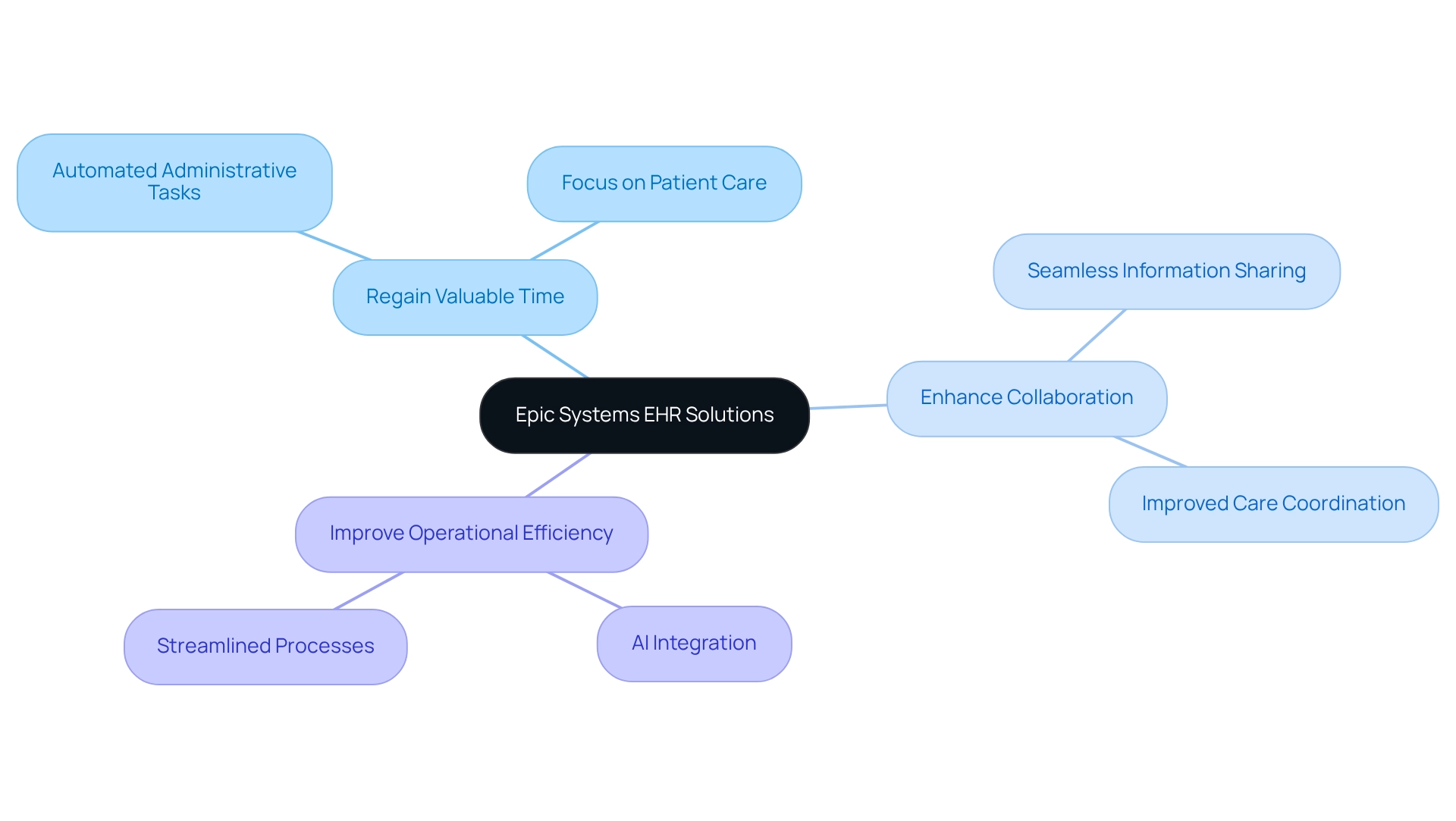
Cerner: Integrated EHR Solutions for Improved Clinical Workflows
In the demanding world of healthcare, providers often face emotional challenges that can hinder their ability to deliver the best care. Cerner's integrated EHR solutions serve as medical software systems examples that are designed to help lighten that load, enhance clinical workflows, and improve care quality. With a broad array of functionalities, including clinical documentation, client scheduling, and advanced data analytics, Cerner’s technology allows medical providers to significantly enhance operational efficiency and reduce errors.
Imagine being able to improve the overall experience for individuals receiving care. By utilizing Cerner's technology, healthcare professionals can regain precious time to focus on what truly matters—delivering high-quality care. The dedication to interoperability enables smooth data exchange across different medical systems, promoting coordinated and comprehensive support. Recent studies indicate that implementing medical software systems examples such as Cerner can reduce the time required to access client information by up to 80%. This underscores the transformative potential of medical software systems examples in .
Furthermore, automating labor-intensive administrative duties, such as appointment scheduling and medical record management, not only alleviates stress but also allows physicians to concentrate on their patients. This focus on enhancing clinical workflows has been validated through numerous case studies, demonstrating measurable improvements in both patient outcomes and operational efficiency.
As we reflect on the words of Charles Darwin, "It is not the strongest of the species that survives, nor the most intelligent, but the one most responsive to change," we recognize the necessity for adaptability in medical technology. The competitive landscape of EHR solutions is evolving, with the Indian Health Service accounting for 0.5% of the ambulatory EHR market as of May 2019, which highlights the growing importance of medical software systems examples in effective EHR systems.
Additionally, understanding the regulatory environment is vital. Rules concerning EHRs differ by nation, and the European Union has enacted new regulations emphasizing data privacy and security standards. These are critical for medical practitioners to consider when implementing EHR solutions. Together, let’s embrace these changes and enhance the care we provide.
Allscripts: Interoperable Solutions for Enhanced Patient Engagement
In the complex world of healthcare, communication challenges can weigh heavily on providers and patients alike. Allscripts offers a collection of medical software systems examples that provide interoperable solutions designed to simplify these communications, significantly improving engagement. Its electronic health record (EHR) systems include features like secure messaging, appointment scheduling, and convenient access to medical records, all aimed at empowering individuals on their wellness journeys.
Furthermore, Allscripts provides user-focused applications and health monitoring tools that invite individuals to take a more active role in their treatment. By promoting interoperability, Allscripts enables healthcare professionals to work together more efficiently, which is essential for enhancing health outcomes and patient satisfaction in . Have you ever wondered how integrated systems can truly transform service delivery? Recent statistics reveal that 26% of hospitals participating in interoperable exchanges reported that clinicians frequently utilized clinical information from external providers, which highlights the significance of medical software systems examples. Moreover, data shows that 47% of urban hospitals were consistently interoperable, compared to just 36% of rural hospitals. This disparity highlights inequalities in access to integrated solutions, including medical software systems examples, that can influence healthcare engagement. As we look towards 2025, advancements in client engagement technology continue to evolve, with Allscripts leading the way in creating user-friendly interfaces that foster active involvement in treatment.
By integrating AI-driven tools, such as automated appointment scheduling and documentation, Allscripts not only alleviates administrative burdens but also allows healthcare professionals to focus more on direct interactions with individuals. This ultimately enhances efficiency and reduces waiting periods. However, it’s vital to recognize the challenges faced by specific demographics, particularly elderly individuals who may encounter technological barriers in utilizing these medical software systems examples. Healthcare practitioners are encouraged to explore the advantages of Allscripts' interoperable solutions to boost engagement and enhance overall care results. Utilizing predictive analytics to identify at-risk individuals and customize interventions accordingly can make a significant difference. Together, we can work towards a more connected and compassionate healthcare experience.
Athenahealth: Cloud-Based Solutions for Streamlined Billing and Practice Management
Healthcare providers often face overwhelming administrative burdens that can detract from their ability to deliver compassionate care. Athenahealth understands these challenges and offers innovative cloud-based solutions that significantly enhance practice management and billing processes. Imagine automated billing and appointment scheduling designed not just for efficiency, but to empower you in your practice.
By streamlining these processes, Athenahealth allows you to alleviate the weight of time-consuming tasks. This automation enables you to regain valuable time, focusing more on what truly matters: delivering high-quality care to your patients.
Consider how much more fulfilling your work could be if you could dedicate your time to patient care rather than paperwork. With Athenahealth, you can and create a more nurturing environment for both you and those you serve.
Take the first step towards a more efficient practice today. Explore how Athenahealth can support you in your journey to provide exceptional care.
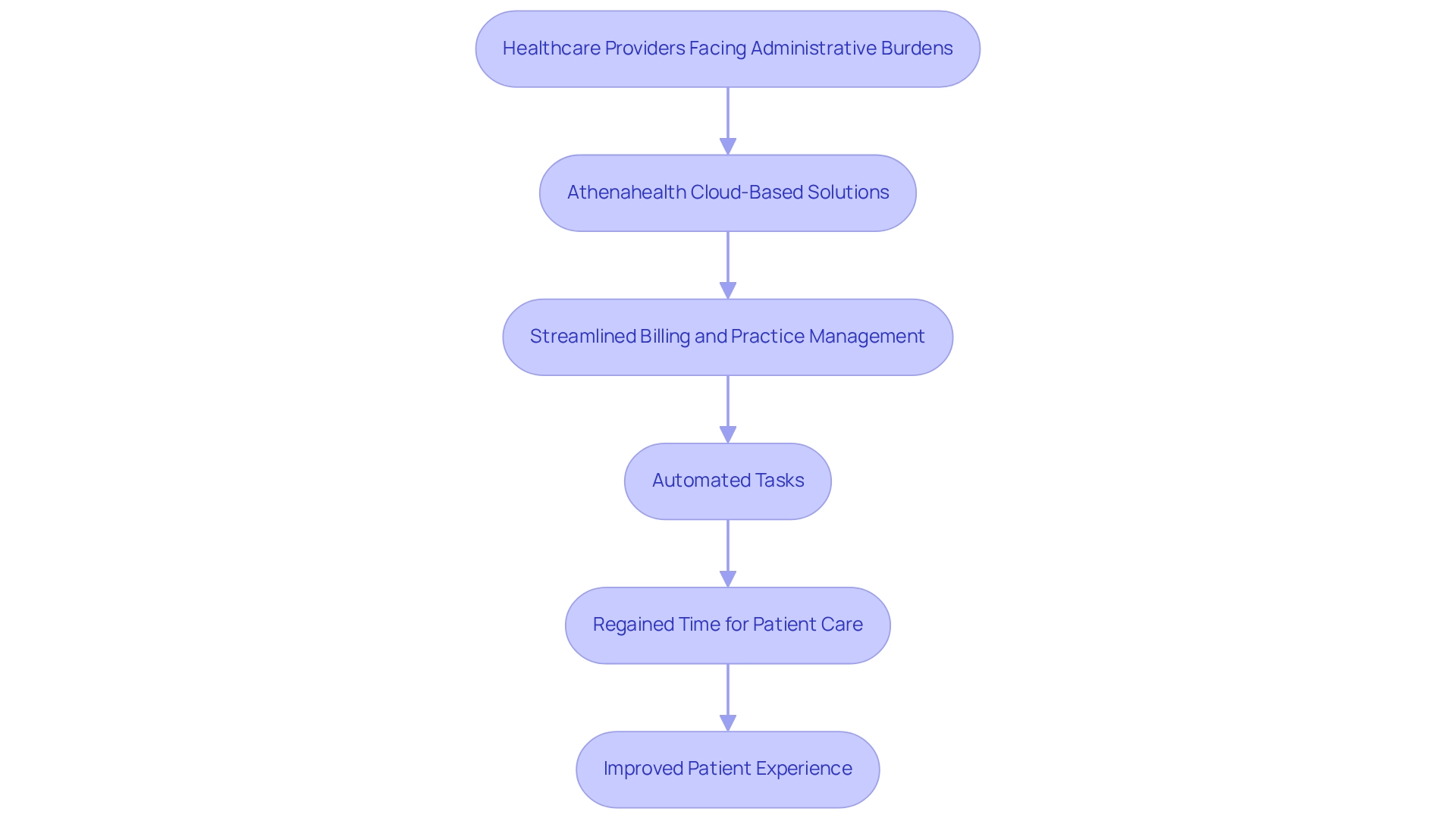
Meditech: User-Friendly EHR Solutions for Diverse Healthcare Environments
Meditech understands the emotional challenges faced by healthcare providers and offers user-friendly EHR solutions, which serve as medical software systems examples tailored for a variety of medical environments, from small practices to large hospital systems. With a focus on usability, the platform features an intuitive interface that empowers medical professionals to manage records efficiently and . This emphasis on user-friendliness is crucial, as studies reveal that 12% of providers find their EHR systems moderately challenging to use, which can impede their interaction with clients. By alleviating administrative burdens, Meditech allows clinicians to dedicate more time to patient care, significantly enhancing the overall quality of medical delivery.
Key features of Meditech's EHR solutions, such as clinical decision support and comprehensive reporting tools, not only streamline workflow efficiency but also elevate the quality of service provided. Have you ever considered how EHR usability impacts physician satisfaction and burnout? A. Jay Holmgren highlights the challenges doctors face with documentation, underscoring the importance of user-friendly systems like Meditech that simplify these tasks. Furthermore, case studies demonstrate how medical software systems examples, such as Meditech and CosmaNeura, effectively reduce administrative burdens and enhance care quality. CosmaNeura's commitment to ethical standards and AI-driven solutions complements Meditech's mission to improve clinical workflows, resulting in better outcomes for patients and greater job satisfaction among healthcare professionals. By automating time-consuming tasks such as appointment scheduling, medical record management, and billing, CosmaNeura helps physicians reclaim valuable time, enabling them to focus on delivering high-quality care.
As we look ahead to the latest advancements in EHR technology for small practices in 2025, including improved interoperability and enhanced data analytics capabilities, Meditech continues to set the standard for user-friendly solutions that prioritize the needs of both clinicians and healthcare recipients. Let's work together to embrace these innovations and create a more compassionate healthcare environment.
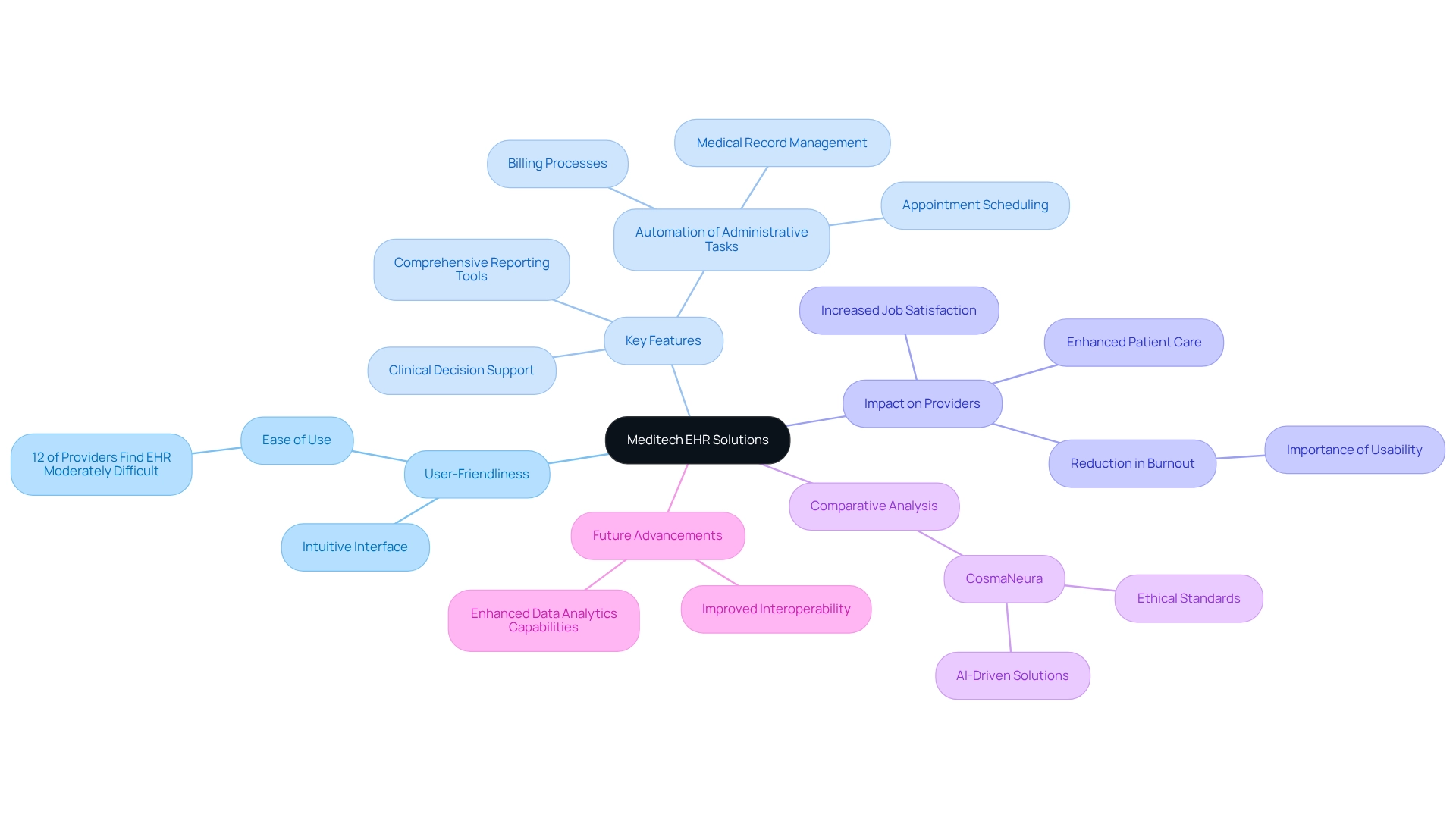
NextGen Healthcare: Integrated Solutions for Operational Efficiency
Healthcare providers often face overwhelming administrative burdens that can detract from their ability to deliver compassionate care. NextGen Healthcare understands these emotional challenges and offers integrated health IT solutions that serve as medical software systems examples designed to alleviate these pressures. By utilizing NextGen's comprehensive platform, which includes medical software systems examples such as electronic health records (EHR), practice management, and telehealth services, healthcare providers can streamline their workflows and focus more on their patients.
With , errors are minimized, and revenue cycles accelerate. This means that clinicians can reclaim valuable time to concentrate on what truly matters—delivering high-quality support to those they assist. The platform's emphasis on interoperability facilitates smooth data exchange across various systems, including medical software systems examples, fostering coordinated care and enhancing the overall patient experience. In fact, some have achieved up to a 30% decrease in administrative tasks, enabling clinicians to devote more time to meaningful interactions with their patients.
As the healthcare landscape continues to evolve, the incorporation of medical software systems examples is essential for providers seeking to enhance their operations and improve client outcomes.
Are you ready to transform your practice and provide the compassionate care your patients deserve? Explore how NextGen can support you in this journey.
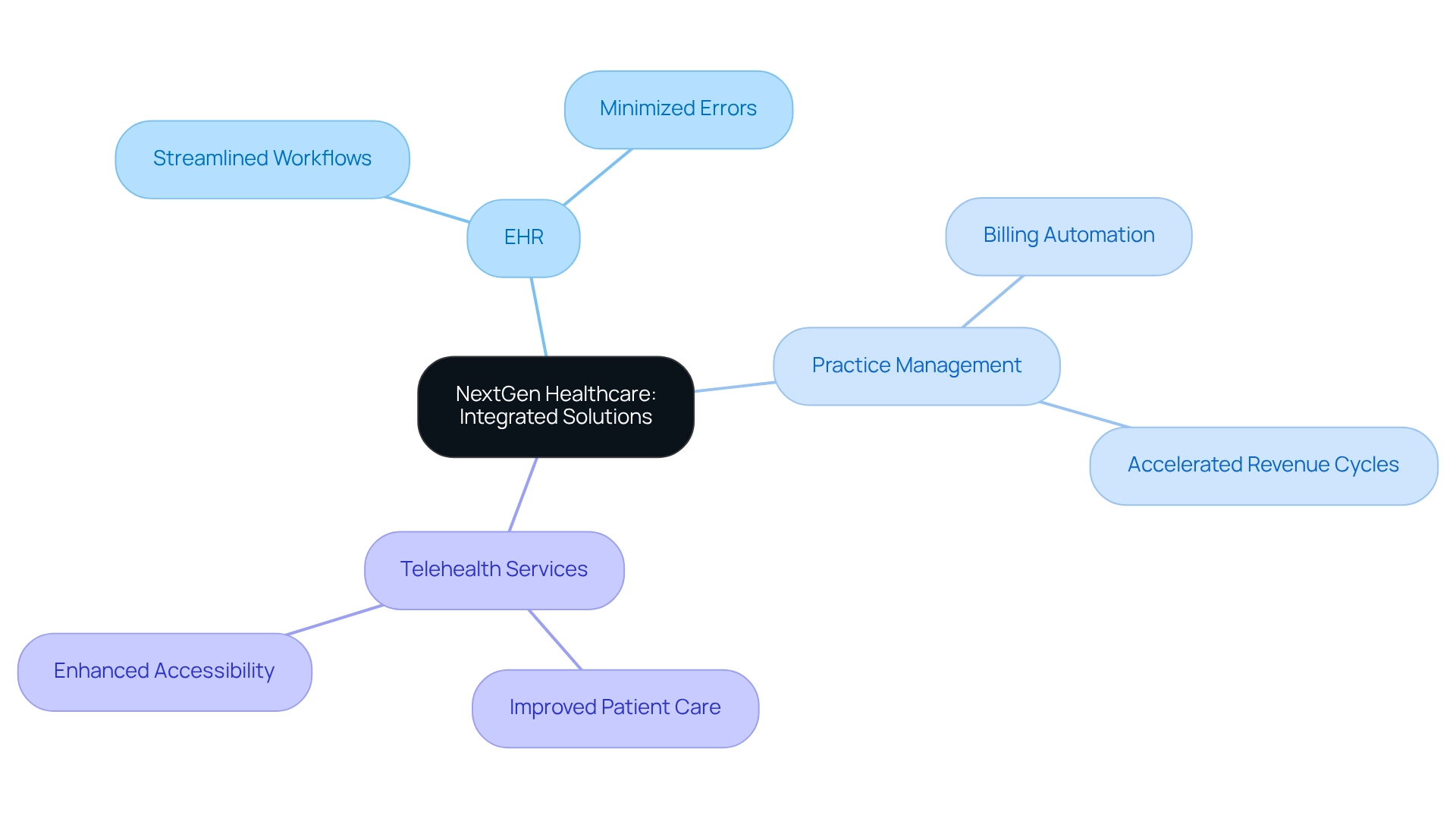
Mediware: Software Solutions for Enhanced Healthcare Delivery
In the demanding world of healthcare, providers often face overwhelming challenges that can detract from their ability to deliver compassionate care. Mediware understands these emotional burdens and offers a comprehensive collection of medical software systems examples designed to alleviate these pressures and enhance medical service delivery across various environments.
Imagine a platform where essential features like client management, billing, and clinical documentation work seamlessly together to enhance operational efficiency. By automating labor-intensive administrative tasks—such as appointment scheduling and medical record handling—medical professionals can reclaim precious time, allowing them to focus on what truly matters: delivering high-quality support to their patients.
This streamlining of processes not only lightens the load on medical teams but also leads to improved treatment outcomes. With effective tools at their disposal, Mediware empowers healthcare providers to ensure that every individual receives they deserve. The software prioritizes usability and fosters seamless integration, enhancing communication and collaboration among healthcare teams.
Consider the positive impact: organizations that have implemented examples of medical software systems report significant improvements in their operational workflows, resulting in enhanced patient management and satisfaction. As emphasized by Intellectsoft, organized data is vital for developing advanced AI systems, further boosting operational efficiency.
As the U.S. government increases funding in digital health, focusing on critical areas like EHR interoperability and telemedicine, Mediware is at the forefront of this transformation. Their innovative software solutions are designed to enhance patient outcomes. As Manvendra Kunwar poignantly states, "This leads to better care and decisions based on data," reinforcing the value of Mediware's offerings in achieving superior medical service delivery.
If you're ready to explore how Mediware can transform your practice and improve patient care, consider reaching out today. Together, we can navigate the complexities of healthcare and ensure that every patient receives the attention and care they deserve.
Zocdoc: Patient-Centric Platform for Improved Access to Healthcare
Zocdoc stands out as a compassionate platform dedicated to helping patients find medical professionals and schedule appointments with ease. By simplifying the appointment process, Zocdoc significantly enhances access to vital medical services, which is crucial for startups navigating complex regulatory landscapes. Its user-friendly interface and extensive listings of healthcare professionals empower individuals to make informed decisions about their care, fostering a sense of control and satisfaction.
Healthcare startups often grapple with stringent regulatory and compliance challenges, making it essential to partner with platforms that truly understand these hurdles. Zocdoc addresses these challenges by strengthening provider relationships and facilitating easier access to care, ultimately enriching the experience for individuals seeking medical attention. Did you know that providers with over 100 reviews attract 27 times more bookings than those with fewer? This statistic highlights Zocdoc's effectiveness in boosting user engagement and loyalty. As Don Berwick, former Administrator of the Centers for Medicare and Medicaid Services, reminds us, genuinely listening to individuals and incorporating their feedback is vital for enhancing . Zocdoc's commitment to improving access aligns beautifully with the broader goal of transforming service delivery, especially for startups that require specialized support to navigate regulatory challenges and improve outcomes for users.
Key features of Zocdoc that support medical startups include:
- Streamlined appointment scheduling to alleviate administrative burdens.
- Extensive provider listings that enhance consumer choice and access.
- User reviews that build trust and foster engagement.
By leveraging these features, Zocdoc not only enhances access for individuals but also supports medical startups in effectively navigating the regulatory landscape.
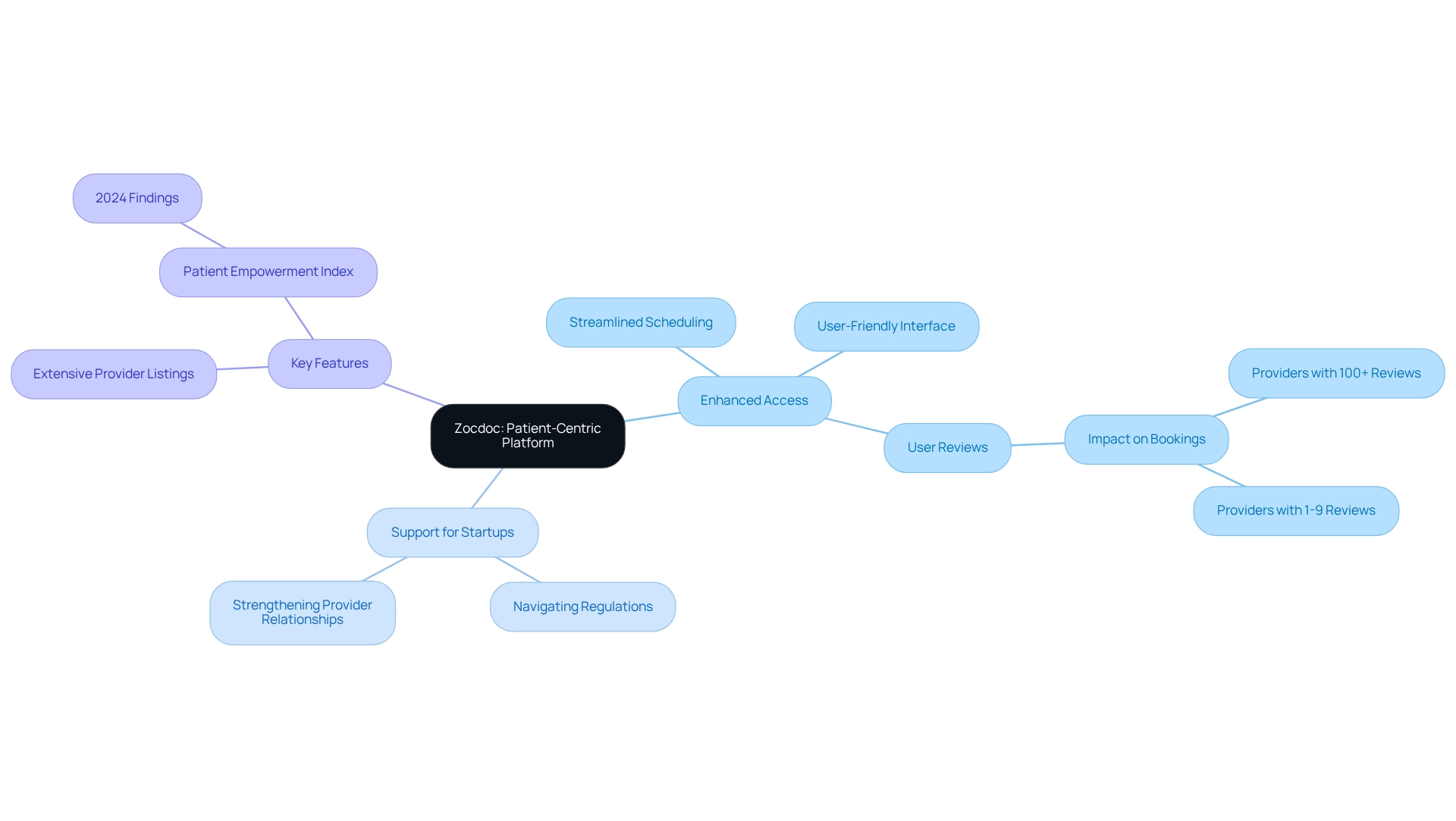
Teladoc Health: Transformative Telehealth Solutions for Accessible Care
Teladoc Health is at the forefront of , making a significant difference in access to medical services for diverse communities. This platform offers a comprehensive suite of services, including virtual consultations, mental health support, and chronic condition management. By leveraging technology to enhance remote support, Teladoc increases convenience for patients and addresses critical access challenges, particularly in underserved regions.
Have you noticed the rising demand for accessible medical solutions? Recent statistics indicate that telehealth service adoption rates are climbing, underscoring the need for effective healthcare delivery. Notably, Eagle assists hospitals nationwide with over 17 specialties, showcasing the extensive range of services available through telehealth platforms like Teladoc.
Moreover, case studies highlight Teladoc's success in improving individual outcomes and satisfaction. With Eagle Telemedicine's support for underserved communities, we see firsthand how telehealth solutions can enhance access to medical services and overall efficiency. As healthcare providers increasingly prioritize clinician retention in light of ongoing physician shortages, integrating AI solutions from CosmaNeura, particularly predictive analytics, can further elevate service quality.
For instance, predictive analytics can monitor individuals with chronic conditions, offering early warnings for potential complications and enabling proactive interventions. This innovative approach aligns seamlessly with the evolving landscape of healthcare delivery, ensuring that patients receive timely and effective care while also addressing physician burnout.
In summary, as we navigate these challenges together, consider how telehealth can transform the way we provide care. Let’s continue to explore these solutions and support one another in delivering the best possible outcomes for our patients.
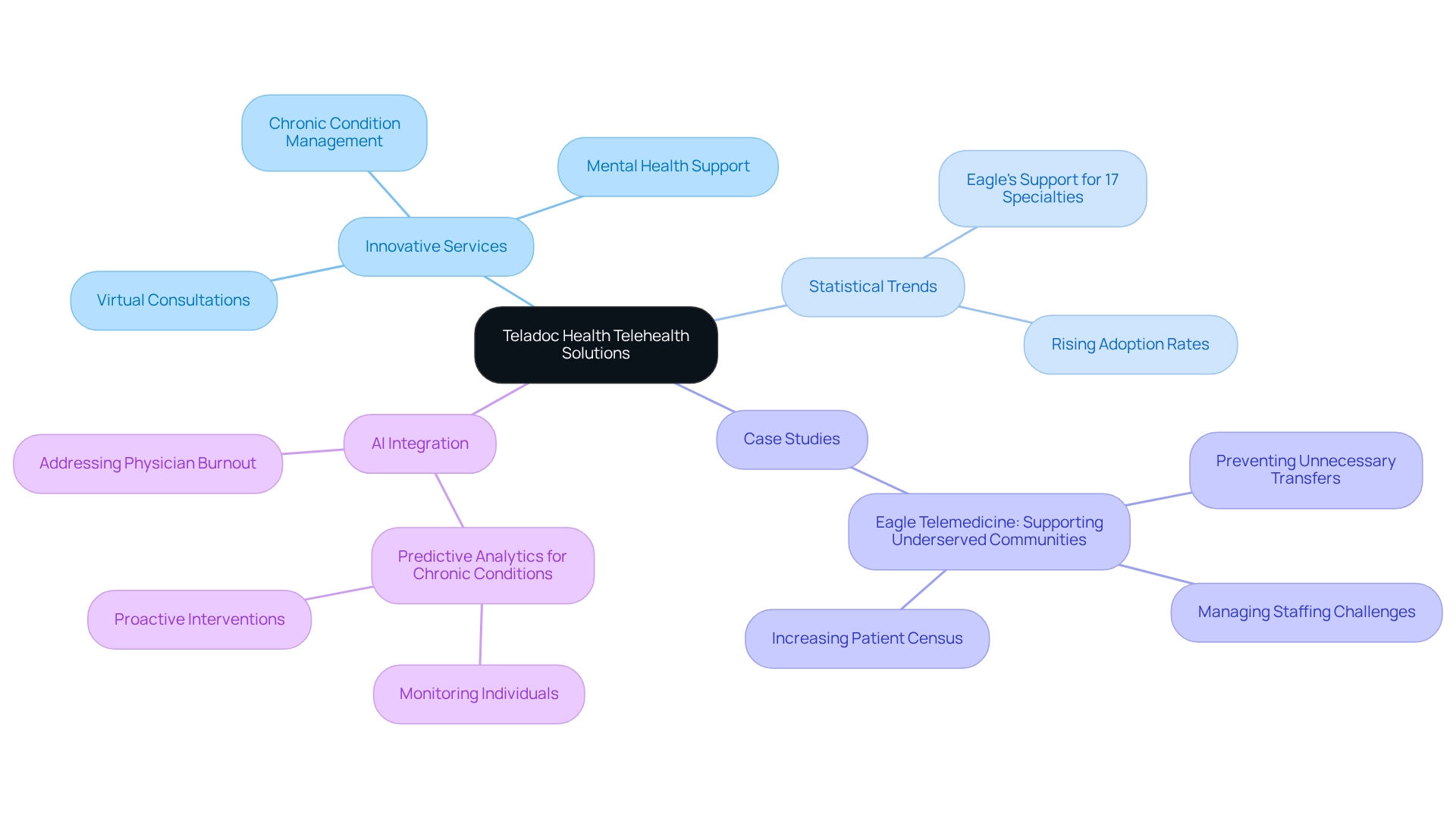
Conclusion
The advancements in healthcare technology present a transformative opportunity for providers to alleviate administrative burdens and enhance the quality of patient care. Consider how overwhelming administrative tasks can be. Platforms like CosmaNeura, Epic Systems, Cerner, and Allscripts allow healthcare professionals to automate essential tasks such as appointment scheduling and medical record management. This automation not only frees up valuable time but also enables clinicians to focus on what truly matters: patient interactions and improving health outcomes.
As we look at the statistics, it’s clear that the adoption of AI and comprehensive EHR solutions is on the rise. Projections suggest significant growth in the coming years. This trend underscores the importance of embracing innovative technologies that streamline operations and foster collaboration among healthcare providers. Interoperability is a key feature here, allowing for seamless information sharing, which is crucial for coordinated patient care.
Moreover, platforms like Zocdoc and Teladoc Health are revolutionizing patient access to healthcare services. They ensure that individuals can easily connect with providers and receive timely care. This focus on patient-centric solutions is essential for addressing the diverse needs of today’s healthcare landscape.
In conclusion, integrating advanced healthcare technologies is not merely a trend but a necessity for providers looking to improve efficiency and enhance patient care. By leveraging these solutions, healthcare organizations can create a more compassionate and effective environment. This ultimately leads to better health outcomes for all. As the industry continues to evolve, it is imperative for healthcare providers to adapt and embrace these innovations. Together, we can remain competitive and deliver the highest quality of care.




